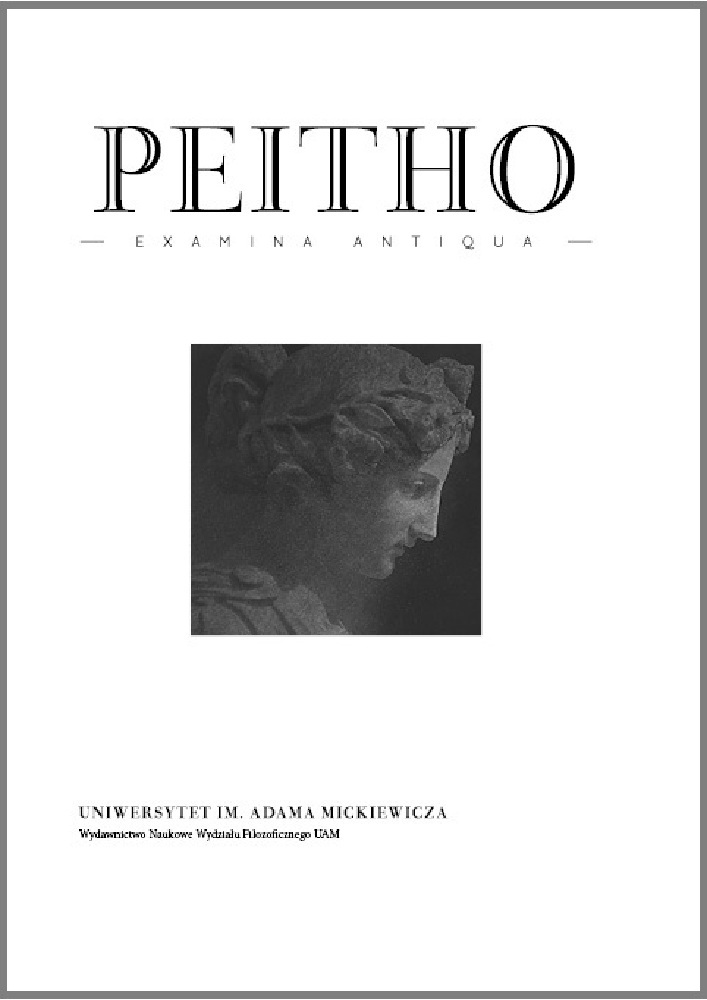Abstract
It is often assumed that the concept of alētheia, or ‘truth’, in Gorgias of Leontini belongs to the art of rhetoric. Along these lines, it is usually understood as an aesthetic concept or even a mere ‘adornment’ of speech. In this paper, it is argued, by contrast, that Gorgianic alētheia is a definable criterion of speech figuring in the practice of moral education. While the ‘truth’ of a logos indeed has to be assessed on aesthetic grounds, the underlying concept of alētheia is predominantly ethical. For Gorgias, speech is ‘true’ when it promotes virtue (aretē) by being expressive of virtue. The principle stated in the opening passage of the Encomium of Helen, that a speaker has ‘to praise what is praiseworthy and to blame what is blameworthy’, explains precisely this understanding of alētheia.
References
Anderson, W., 1966, Ethos and Education in Greek Music. The Evidence of Poetry and Philosophy, Cambridge. https://doi.org/10.4159/harvard.9780674729254 DOI: https://doi.org/10.4159/harvard.9780674729254
Aristotle, 1959, The 'Art' of Rhetoric, J.H. Freese (ed.), London-Cambridge.
Buchheim, T., 1985, "Maler, Sprachbildner. Zur Verwandtschaft des Gorgias mit Empedokles", Hermes 113, pp. 417-429.
Buchheim, T. (ed.), 2012, Gorgias von Leontinoi: Reden, Fragmente und Testimonien, Hamburg.
Colagero, G., 1932/1977 , Studi sull' Eleatismo, Florence.
Cole, T., 1983, "Archaic Truth", Quaderni Urbinati di Cultura Classica 13, pp. 7-28. https://doi.org/10.2307/20538760 DOI: https://doi.org/10.2307/20538760
Cole, T., 1991, The Origins of Rhetoric in Ancient Greece, Baltimore-London.
Consigny, S., 1992, "Gorgias's Use of the Epideictic", Philosophy and Rhetoric 25, pp. 281-297.
Consigny, S., 2001, Gorgias. Sophist and Artist, Columbia.
Detienne, M., 1967/1999, The Masters of Truth in Archaic Greece, New York.
Diels, H., Kranz, W. (eds.), 1952, Die Fragmente der Vorsokratiker, Vol. 1-3, Berlin.
Dillon, J., Gergel, T. (eds.), 2003, The Greek Sophists, London.
Ford, A., 2001, "Sophists without Rhetoric: The Arts of Speech in Fifth-Century Athens", in: Y. L. Too (ed.), Education in Greek and Roman Antiquity, Leiden, pp. 85-109. https://doi.org/10.1163/9789047400134_004 DOI: https://doi.org/10.1163/9789047400134_004
Gagarin, M., 2001, "Did the Sophists Aim to Persuade?", Rhetorica 19, pp. 275-291. https://doi.org/10.1525/rh.2001.19.3.275 DOI: https://doi.org/10.1525/rh.2001.19.3.275
Giombini, S., 2012, Gorgia epidittico. Commento filosofico all' Encomio di Elena, all' Apoligia di Palamede, all' Eppitaffio, Perugia.
Halliwell, S., 2011, Between Ecstasy and Truth. Interpretations of Greek Poetics from Homer to Longinus, Oxford. https://doi.org/10.1093/acprof:oso/9780199570560.001.0001 DOI: https://doi.org/10.1093/acprof:oso/9780199570560.001.0001
Hegel, G. W. F., 1833/1986, Vorlesungen zur Geschichte der Philosophie, Frankfurt a.M. https://doi.org/10.28937/978-3-7873-2537-5 DOI: https://doi.org/10.28937/978-3-7873-2537-5
Heidegger, M., 1997, Vom Wesen der Wahrheit. Zu Platons Höhlengleichnis und Theätet (Wintersemester 1931/32), Frankfurt a.M.
Kennedy, G. A., 1972, "Gorgias", in: R. K. Sprague (ed.), The Older Sophists, Columbia, pp. 30-67.
Kennedy, G. A., 1980, Classical Rhetoric and its Christian and Secular Tradition from Ancient to Modern Times, Chapel Hill. https://doi.org/10.2307/1770910 DOI: https://doi.org/10.2307/1770910
Kerferd, G. B., 1981, The Sophistic Movement, Cambridge.
Kraus, M., 2012, "The Making of Truth in Debate. The Case of (and a Case for) the Early Sophists", in: C. Kock, L. S. Villadsen (eds.), Rhetorical Citizenship and Public Deliberation, University Park, pp. 28-45. https://doi.org/10.5325/j.ctt7v660.6 DOI: https://doi.org/10.5325/j.ctt7v660.6
Kube, J., 1969, ΤΕΧΝΕ und ΑΡΕΤΗ. Sophistisches und platonisches Tugendwissen, Berlin. https://doi.org/10.1515/9783110840919 DOI: https://doi.org/10.1515/9783110840919
Leeten, L., 2017, "Verliert die Philosophie ihren Erzrivalen? Ein Blick auf den aktuellen Stand der Sophistik¬forschung", Allgemeine Zeitschrift für Philosophie 41, pp. 77-103.
Luzzatto, M. T., 2020, "Did Gorgias Coin Rhetorike? A Rereading of Plato's Gorgias", Lexis 38, pp. 183-224. https://doi.org/10.30687/Lexis/2210-8823/2020/01/007 DOI: https://doi.org/10.30687/Lexis/2210-8823/2020/01/007
MacDowell, D. M., 2005, Gorgias: Encomion of Helen, Bristol.
McComiskey, B., 1997, "Gorgias and the Art of Rhetoric: Toward a Holistic Reading of the Extant Gorgianic Fragments", Rhetoric Society Quarterly 27, pp. 5-24. https://doi.org/10.1080/02773949709391103 DOI: https://doi.org/10.1080/02773949709391103
McComiskey, B., 2002, Gorgias and the New Sophistic Rhetoric, Carbondale.
Mourelatos, A., 1987, "Gorgias on the Function of Language", Philosophical Topics 15, pp. 135-170. https://doi.org/10.5840/philtopics19871527 DOI: https://doi.org/10.5840/philtopics19871527
Newiger, H.-J., 1973, Untersuchungen zu Gorgias' Schrift Über das Nichtseiende, Berlin-New York. https://doi.org/10.1515/9783110834673 DOI: https://doi.org/10.1515/9783110834673
Pfau, M. W., 2000, "Encomium on Helen as Advertisement: Political Life According to Gorgias the Barbarian", Advances in the History of Rhetoric 3, pp. 11-22. https://doi.org/10.1080/15362426.1998.10500515 DOI: https://doi.org/10.1080/15362426.1998.10500515
Pindar, 1967, Siegesgesänge und Fragmente, O. Werner (ed.), München. https://doi.org/10.1515/9783110355697 DOI: https://doi.org/10.1515/9783110355697
Porter, J. I., 1993, "The Seductions of Gorgias", Classical Antiquity 12, pp. 267-299. https://doi.org/10.2307/25010996 DOI: https://doi.org/10.2307/25010996
Poulakos, J., 1983, "Gorgias' Encomium to Helen and the Defense of Rhetoric", Rhetorica 1, pp. 1-16. https://doi.org/10.1525/rh.1983.1.2.1 DOI: https://doi.org/10.1525/rh.1983.1.2.1
Pratt, J., 2015, "On the threshold of rhetoric. Gorgias' Encomium of Helen", Classical Antiquity 34, pp. 163-182. https://doi.org/10.1525/CA.2015.34.1.163 DOI: https://doi.org/10.1525/CA.2015.34.1.163
Schiappa, E., 1999, The Beginnings of Rhetorical Theory in Classical Greece, New Haven-London.
Schirren, T., Zinsmaier, T. (eds.), 2003, Die Sophisten, Stuttgart.
Segal, C. P., 1962, "Gorgias and the Psychology of the Logos", Harvard Studies in Classical Philology 66, pp. 99-155. https://doi.org/10.2307/310738 DOI: https://doi.org/10.2307/310738
Spatharas, D. G., 2001, "Patterns of Argumentation in Gorgias", Mnemoyne 54, pp. 393-408. https://doi.org/10.1163/15685250152902937 DOI: https://doi.org/10.1163/15685250152902937
Valiavitcharska, V., 2006, "Correct Logos and Truth in Gorgias' Encomium of Helen", Rhetorica 24, pp. 147-161. https://doi.org/10.1525/rh.2006.24.2.147 DOI: https://doi.org/10.1525/rh.2006.24.2.147
Van Hook, L., 1913, "The Encomium on Helen, by Gorgias", The Classical Weekly 6, pp. 122-123. https://doi.org/10.2307/4386697 DOI: https://doi.org/10.2307/4386697
Walsh, G. B., 1984, The Varieties of Enchantment. Early Greek Views of the Nature and Function of Poetry, Chapel Hill-London.
Wardy, R., 1996, The Birth of Rhetoric. Gorgias, Plato and their Successors, London-New York.
Williams, B., 2002, Truth and Truthfulness. An Essay in Genealogy, Princeton-Oxford.
Worman, N., 1997, "The Body as Argument: Helen in Four Greek Texts", Classical Antiquity 16, pp. 151-203. https://doi.org/10.2307/25011057 DOI: https://doi.org/10.2307/25011057
License
Copyright (c) 2022 Lars Leteen

This work is licensed under a Creative Commons Attribution 4.0 International License.
Peitho provides immediate open access to its content on the principle that making research freely available to the public supports a greater global exchange of knowledge.
